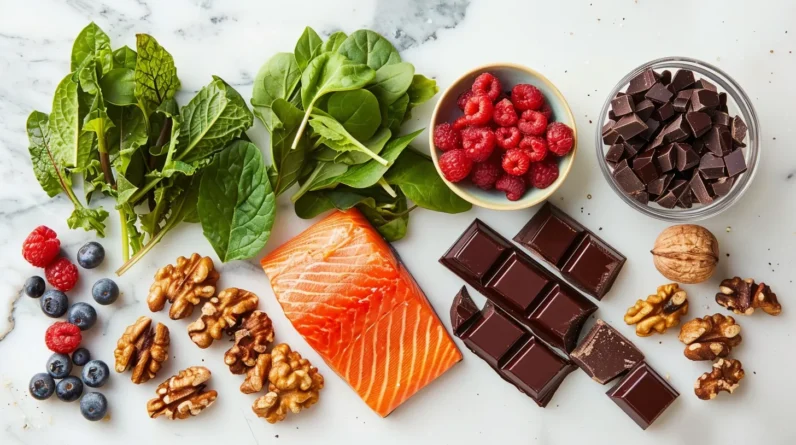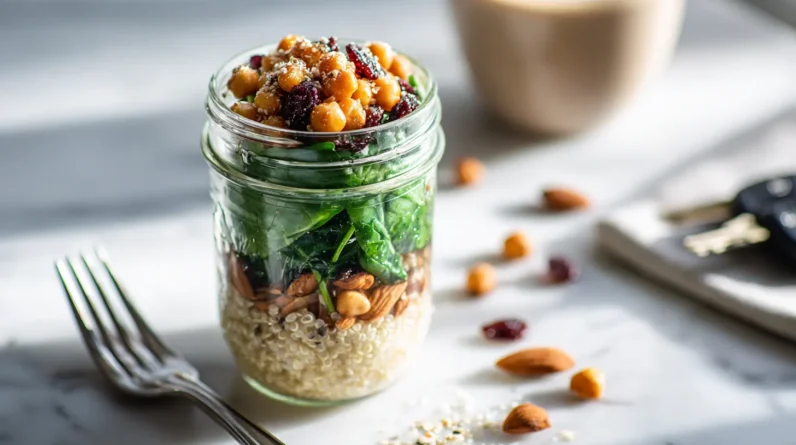
When we’re stressed, our bodies crave specific nutrients to maintain balance and resilience. Key vitamins like B-complex and minerals such as magnesium play vital roles in regulating our stress responses. By understanding how stress impacts our physiology, we can strategically use nutrition to bolster our mental and physical well-being. Let’s explore the science behind stress and uncover the hidden power of nutrition to transform our resilience.
The Science of Stress and Nutrition
When we experience stress, our bodies undergo a complex array of physiological changes that affect nearly every system. The cardiovascular, respiratory, endocrine, gastrointestinal, nervous, muscular, and reproductive systems all experience significant impacts. Acute stress activates the sympathetic nervous system, increasing cortisol and catecholamine release, while the parasympathetic system aids recovery after stress subsides. Chronic stress leads to endothelial dysfunction, inflammation, and increased risk of atherosclerosis. The digestive system is also affected, with stress causing excess stomach acid production and impaired gastrointestinal motility. Muscle tension is a reflex response to stress, and chronic tension can lead to headaches, back pain, and musculoskeletal disorders. Understanding these physiological changes is vital for developing effective strategies to mitigate the negative effects of stress through proper nutrition and self-care techniques.
Essential Nutrients for Stress Resilience
Understanding the physiological impact of stress on our bodies is the first step towards mitigating its effects. Key nutrients play pivotal roles in our stress resilience and overall well-being. Iron, for instance, is vital for oxygen transport and energy, with deficiencies exacerbating stress-induced fatigue. B vitamins support energy metabolism and mood regulation, counteracting the depletion caused by stress. Magnesium aids in nervous system regulation, while vitamin C bolsters our immune system and acts as an antioxidant. Omega-3 fatty acids are essential for brain health and emotional regulation, reducing inflammation linked to mood disorders. Incorporating foods rich in these nutrients can substantially enhance our ability to cope with stress.
Hormonal Balance Through Diet
Diet plays a crucial role in maintaining hormonal balance, particularly for women under stress. Fiber-rich foods slow digestion, promote blood sugar stability, and support hormone regulation. Healthy fats from sources like avocados and nuts are essential building blocks for steroid hormones. Chronic stress elevates cortisol levels, disrupting estrogen, progesterone, and testosterone balance. Plant-based and Mediterranean dietary patterns reduce obesity-related endocrine disruptions and improve metabolic health. Balanced macronutrient intake, including proteins for hormone synthesis and carbohydrates for mood stability, optimizes hormonal outcomes. By making strategic dietary choices, we can mitigate stress’s impact on our endocrine system and promote hormonal harmony.
Supplements: Help or Hype?
While a balanced diet should always be our first line of defense, supplements can play a supportive role in stress management for women. Clinical trials show ashwagandha root extract substantially reduces perceived stress and cortisol levels within 30 to 90 days. Vitamin B complex supplementation consistently lowers cortisol and supports neurotransmitter synthesis critical for mood regulation. Multinutrient and herbal synergistic formulations demonstrate enhanced stress reduction compared to single supplements alone. However, evidence for other popular supplements like kava, GABA, and CBD remains limited and inconclusive. When considering supplementation, it’s essential to consult with a healthcare professional and prioritize research-backed ingredients as part of a thorough approach to stress management.
The Mental Health Diet Connection
As we shift our focus to the intricate relationship between diet and mental health, it’s clear that what we eat profoundly influences our emotional well-being. Nutrients like omega-3s, B vitamins, and antioxidants support brain function and neurotransmitter synthesis, impacting mood regulation. Diets rich in fruits, vegetables, and whole grains are linked to better mental well-being, while those high in refined sugars and unhealthy fats correlate with increased depressive symptoms. Additionally, a healthy gut microbiome, supported by fiber and probiotics, affects brain function via the gut-brain axis. Chronic inflammation from poor nutrition can also exacerbate mental health issues, highlighting the importance of an anti-inflammatory diet for psychological resilience.
Practical Eating Strategies for Stress Management
When it comes to managing stress through our diet, we must adopt a multi-faceted approach that addresses both the physical and emotional aspects of eating. By identifying emotional triggers and practicing mindful eating, we can better regulate our responses to stress. Incorporating specific nutrients and adopting lifestyle supports further bolsters our resilience.
| Stress-Reducing Foods | Benefits |
|---|---|
| Fermented foods | Boost gut health, linked to reduced anxiety |
| Turmeric with black pepper | Anti-inflammatory, may lower anxiety levels |
| Balanced meals | Supports brain-body balance for stress resilience |
| Adequate hydration | Stabilizes mood, decreases cravings |
Through a holistic approach that integrates emotional awareness, nutritional strategies, and lifestyle adjustments, we can effectively manage stress and foster a healthier relationship with food.
Conclusion
As we conclude, picture a resilient tree, weathering life’s storms. By harnessing nutrition’s power, we too can stand strong against stress. The science is clear: essential nutrients, hormonal balance, and mindful eating form our roots. Supplements may offer additional support. Remember, our diet deeply impacts mental health. Let’s implement these strategies, nourishing ourselves from within. Together, we can cultivate an inner landscape of calm amidst chaos, thriving in the face of challenges.







